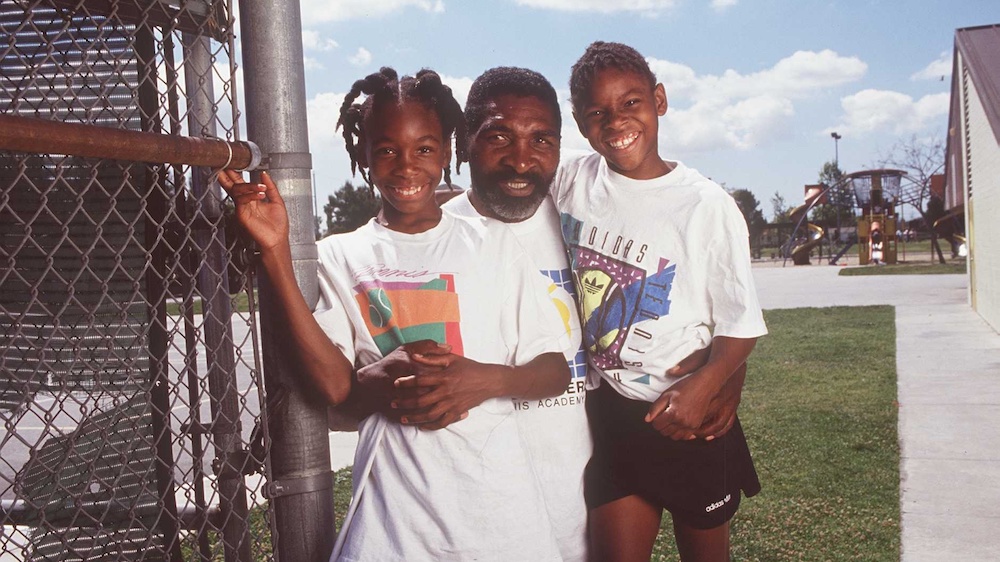If you’re interested in sharing your opinion on any cultural, political or personal topic, create an account here and check out our how-to post to learn more.
____
The year-end holiday season is upon us! This time, instead of Zoom dinners and FaceTime calls, many of us actually want to be together with the ones we love. This time of togetherness can also compel deep learning and even deeper understanding.
As part of that effort, I’m urging every Black family to sit down and watch King Richard, the newly released biopic about a Black family, Black fatherhood and Black success.
Unlike other holiday movies, King Richard — which can be seen in theaters and on HBO Max — is executive produced by Black men and directed by Reinaldo Marcus Green, a Black man. Featuring two-time Academy Award nominee Will Smith, who plays the role of a father willing to risk it all for his children’s success, the film brings charisma, love and the fortitude that Black fathers throughout America display on a daily basis — a vision rarely seen in mainstream media.
For those who don’t know, Richard Williams, or King Richard, the titular character of the movie, raised five daughters — including tennis phenoms Venus and Serena Williams — in Compton, California, in the early 1990s. The movie focuses on his relationship with the sisters who we’ve come to revere.
The film opens with Richard Williams shopping his brochure about Venus and Serena’s skill to professional tennis coaches throughout the Los Angeles area. Despite numerous rejections, Richard’s belief in his “78-page plan for their career” never falters. As the runtime progresses, he faces a plethora of challenges, ranging from racism to confrontations with gangs on the streets of Compton.
Throughout the film, Richard is assailed on all fronts by neighbors, gang members, media critics, coaches, child welfare agents and sometimes his own thoughts.
Richard himself is a man conflicted. Grappling with the ills of his tumultuous upbringing, he struggles to find the balance between empowering his daughters and allowing his protective paternal instinct to lead. Toward the film’s climax, Richard shares a heartfelt childhood story with Venus.
Richard’s words are weighted as he proclaimed to his daughter Venus during the movie, “Now I haven’t been no great daddy, but I’ve never done nothing but try to protect you. This next step you are about to take, it would be hard for anybody. But for you, you are not just going to be representing you. You gonna be representing every little Black girl on Earth. And you gonna be the one gotta go through that gate … and I just never wanted you to look up and see your daddy running away!”
As a Black man, I found Williams’ declaration exceptionally poignant. Although this is a movie, Richard is a real man and real Black father; these events really transpired. Modern media has seldom portrayed Black men, or perhaps more relevantly, Black fathers, in a positive light.
In fact, modern media seems to be fixated with perpetuating the notion that a lack of Black fathers directly correlates to any ills Black communities may face. Proponents of this theory run the gamut.
Regrettably, this rhetoric has even seeped into the hearts, minds and mouths of prominent Black men and fathers, including former President Barack Obama, who in referring to Black fathers said, “They have abandoned their responsibilities, acting like boys instead of men.”
This barrage of misinformation disseminated across public platforms has generated a widely accepted belief that Black men are absentee fathers. However, this harmful narrative has been challenged, debunked and made to be a fallacy by academia and government agencies.
In 2013, the CDC conducted a study that concluded nearly 70% of Black fathers were intimately involved in their children’s lives (bathing, feeding, changing diapers and potty training), whereas only 60% of white fathers and 45% of Hispanic fathers had done such. Yet somehow, despite credible evidence to the contrary, proponents of the fatherless Black people myth remain adamant in their condemnations.
In the last decade, we’ve witnessed the continuous rise of empowering movements for Black women, such as “Black Girls Rock!,” “Black Girl Magic” and the aptly named #WinWithBlackWomen.
We’ve also seen the rise of Black women activists, including Adjoa B. Asamoah and Jotaka Eaddy, both of whom are helping to reclaim the narrative of Black women in America. Asamoah has been fighting to preserve our culture through brilliant legislation, like the CROWN Act, while Eaddy has created a platform (#WinWithBlackWomen) for Black women leaders to be celebrated for their contributions and uplifted and supported in their future endeavors. These movements have shifted the narrative surrounding Black women, focalizing their organizational prowess and integral position as leaders within our communities.
As Black men, we must follow our sisters’ lead. For far too long, we have let the media landscape shape our narrative — and that must come to an end. We must begin to uplift the work of organizations like Native Son — a platform created to provide voice, visibility and elevation to Black gay male voices — and our own voices. As we head into a new year, we must reclaim our stories, stop the perpetuation of these myths and respect ourselves enough to lead as graciously as the queens who precede us.
While movies like King Richard are certainly a great start, there is more work to be done. Richard Williams is a reflection of every Black father out there actively doing their best to ensure their children have a prosperous life. To Black fathers worldwide, King Richard is you. Let’s channel his determination and resilience together as we march toward the pros: a pro-Black, pro-fatherhood and prosperous future.
